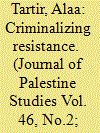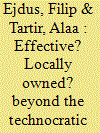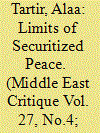| Srl | Item |
| 1 |
ID:
154276


|
|
|
|
|
| Summary/Abstract |
The Palestinian Authority (PA) adopted donor-driven security sector reform (SSR) as the linchpin to its post-2007 state-building project. As SSR proceeded, the occupied West Bank became a securitized space and the theater for PA security campaigns whose ostensible purpose was to establish law and order. This article tackles the consequences of the PA’s security campaigns in Balata and Jenin refugee camps from the people’s perspective through a bottom-up ethnographic methodological approach. These voices from below problematize and examine the security campaigns, illustrating how and why resistance against Israel has been criminalized. The article concludes by arguing that conducting security reform to ensure stability within the context of colonial occupation and without addressing the imbalances of power can only ever have two outcomes: “better” collaboration with the occupying power and a violation of Palestinians’ security and national rights by their own security forces.
|
|
|
|
|
|
|
|
|
|
|
|
|
|
|
|
| 2 |
ID:
157983


|
|
|
|
|
| Summary/Abstract |
The European Union Police Mission for the Palestinian Territories (EUPOL COPPS) was established in 2006 to contribute to the establishment of effective policing in support of an independent and democratic Palestinian state. EUPOL COPPS is often commended for its contribution to the professionalization of the Palestinian security sector under local ownership. Drawing on 40 interviews, we argue that the mission can be considered effective and locally owned only from a narrow technocratic perspective, which denies the political reality of continued occupation and absence of democracy. A broader analysis, which includes the voices of ordinary Palestinians, reveals that EUPOL COPPS contributed to the professionalization of authoritarian policing under continued Israeli occupation. Our findings show the limits of technocratic approaches to peacebuilding interventions and call for a stronger engagement with the ultimate beneficiaries of peacebuilding missions.
|
|
|
|
|
|
|
|
|
|
|
|
|
|
|
|
| 3 |
ID:
169452


|
|
|
|
|
| Summary/Abstract |
Since the Oslo Accords came into force in 1993, the European Union (EU) and its individual member-states have invested billions of Euros, with a view to establishing the basis for an independent and sovereign Palestinian state. As Israel’s colonization of the Palestinian West Bank has progressed, Palestinian statehood has become little more than a myth. As the state-building process has atrophied, securitization has found a renewed impetus, being elevated at the expense of initiatives that seek to promote democratization. This article argues that, far from being a neutral process grounded within the building of capacities, Security Sector Reform (SSR) has strengthened the foundations of Palestinian authoritarianism. In focusing upon the development of the EU’s police mission in the West Bank (EUPOL COPPS), this article argues that EU-sponsored ‘reform’ has contributed directly to the ‘professionalization’ of Palestinian authoritarianism. The article therefore suggests that the EU consistently has failed to acknowledge the political implications that extend from its technical mandate and interventions. The EU has become, to the extent that its interventions extend Israel’s colonial project, part of the problem. In concluding, the article offers an assessment of the decade-long EUPOL COPPS (The European Union Police Mission for the Palestinian Territories) commitment, with a view to developing key lessons and recommendations that can inform future EU interventions.
|
|
|
|
|
|
|
|
|
|
|
|
|
|
|
|